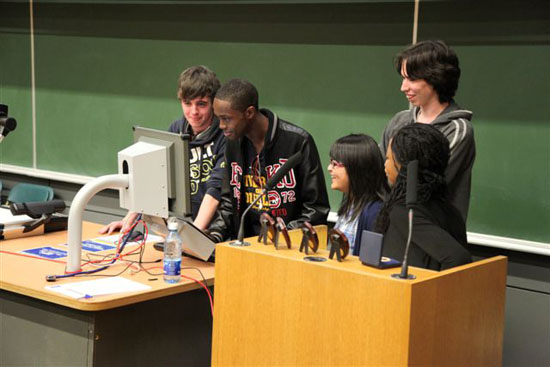Trinity Education Initiatives Short Listed for World Innovation Summit in Education Awards
Posted on: 11 September 2012
Three Trinity College Dublin education initiatives have been short listed together for the renowned World Innovation Summit in Education awards (WISE). The Trinity Access Programmes (TAP), Bridge21, and the National Institute for Intellectual Disability (NIID) are one of 24 finalists in the global competition run by the Qatar Foundation, which will announce the winning programmes later this month.
The WISE awards are designed to identify, showcase and promote innovative educational projects from all sectors and regions of the world. Each year, a jury composed of leading experts from the education world selects six innovative projects for their concrete and positive impact on communities and societies. The winning projects gain global visibility and receive a prize of $20,000.
“We are delighted that Trinity College’s programmes have been selected from an international field of more than 400 after a rigorous selection and review process,” stated Trinity’s Senior Lecturer, Patrick Geoghegan. “These programmes form a core part of the educational mission of TCD and are represented as flagship university initiatives within the Engagement to Society theme of the College’s Strategic Plan 2009-14.

TAP students presenting their project work during a TAP Summer School workshop
The Trinity Access Programmes (TAP) has a range of programme activities for primary school pupils through to mature learners and its students have a 95.6% progression rate in Trinity. It consists of four programmes: School & Community Outreach Links involving 5,000 students, parents and teachers annually from 40 disadvantaged schools; university preparation courses for up to 125 disadvantaged adults and young adults annually; the Higher Education Access Route; and the Post-Entry Progression Programme, supporting approximately 1,800 young adults and mature learners.
Bridge21 is an innovative collaboration between the NGO SUAS Educational Development and Trinity’s Centre for Research in IT in Education (a collaboration between the School of Education and the School of Computer Science & Statistics) and presents an alternative learning model with three core strands: the Schools’ Transformation Programme to scale and adapt its learning model for use in Irish second-level schools; Bridge2College Outreach Programme, a team-based experience for young people to explore learning through technology; and a Learning and Research Centre to innovate, evaluate and refine 21st-century learning methodologies.The NIID promotes lifelong learning for people with intellectual disabilities through three components: the Certificate in Contemporary Living, an inclusive education programme for students with intellectual disabilities, development and implementation of inclusive research practice; and parent/family and public education.
“The mission of these three programmes is to widen the participation at third level of socio-economically disadvantaged individuals, to develop innovative and potentially transformative solutions to challenges in the education system and to promote inclusion for people with intellectual disabilities through education, research and advocacy,” stated Director of the Trinity Access Programmes, Cliona Hannon. “With the principal stakeholders being second and third-level students, as well as parents, the academic community, and corporate and state supporters, together, these three initiatives aim to transform the educational landscape of Ireland by developing new learning methodologies, new concepts about who ‘belongs’ in an elite university and innovative projects to contribute towards the realisation of human potential across the social and ability spectrum.”
